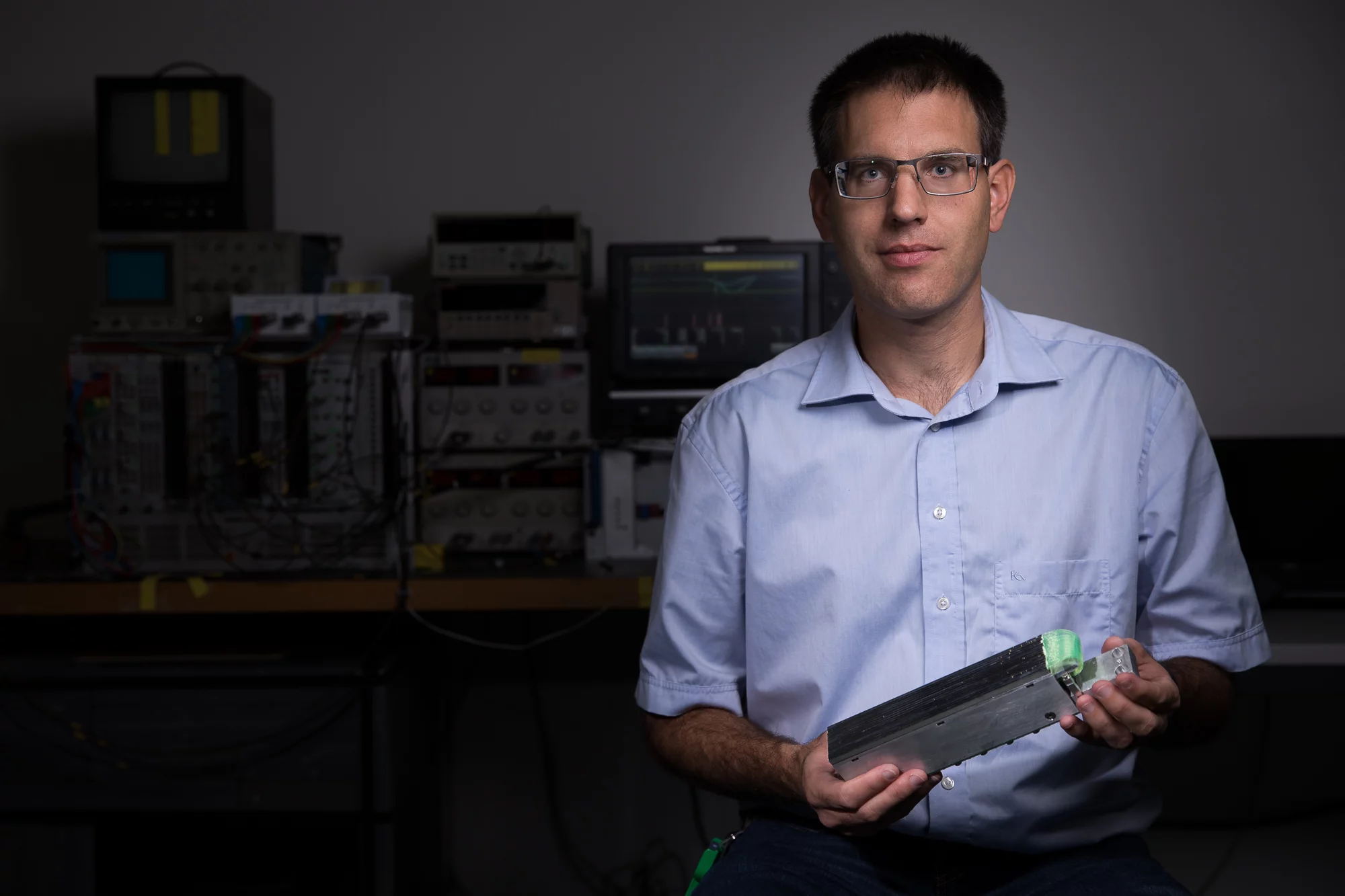Jean-Baptiste Mosset wants to commercialise a neutron detector to spot plutonium and uranium.
After completing physics studies at EPFL in Lausanne, Jean-Baptiste Mosset wanted to become a physics teacher. But during his year of senior-class teacher training, it became clear to the then-25-year-old that he didn't want to spend his working life in a classroom. Jean-Baptiste Mosset became a researcher. Today, 15 years later, he stands again at a critical juncture. He is venturing into the role of an entrepreneur. For my whole scientific career, I have been building prototypes
, Mosset says. Now I want to develop a product that will be mass-produced.
The first prototype was a positron-emission tomography (PET) scanner used in biology and pharmacology, for example, to follow the movement of antibodies in laboratory mice. Mosset developed a gamma-ray detector for the system, as part of his doctoral project. Then, he took up a postdoctoral position at EPFL where, as part of a research group, he built an electromagnetic calorimeter that was supposed to measure the energy distribution of cosmic rays while suspended from a research balloon. Before the prototype was finished, however, the project was cancelled. Mosset found a job in the Laboratory for Particle Physics at PSI. I was very lucky
, he says. It was the perfect position for me.
The laboratory developed a neutron detector that could be used, for example, to detect neutrons in studies of materials at PSI's neutron source SINQ. What's special about this detector: It is designed to detect neutrons without helium-3, the expensive gas used in neutron detectors up to now. Mosset and his research colleagues replaced helium-3 with a less expensive technology, based on zinc sulfide phosphor with lithium-6Li fluoride and optical fibres, and obtained equally good performance.
In January 2016, Jean-Baptiste Mosset talked about his new method with a PSI colleague who works in the Nuclear Energy and Safety Research Division, which among other things analyses the fuel rods of the Swiss nuclear power plants. The colleague asked Mosset if this method could also be used to detect fast neutrons as they are produced in radioactive materials. Mosset built a small prototype, which he successfully modified for this purpose. The only question: Where, other than scientific institutes, is there a market for such a device? Mosset looked into this and found out that in the years since 9/11, 12,000 neutron detectors were installed in shipping ports, border crossings, and airports worldwide to prevent terror attacks with plutonium. With Jean-Baptiste Mosset's new technology, less expensive and more efficient neutron detectors could be developed. In the next 18 months, Mosset wants to further develop his prototype and find out if demand for this technology exists in industry.
Text: Joel Bedetti
Contact
Dr. Jean-Baptiste MossetGoup Detectors
Paul Scherrer Institute, 5232 Villigen PSI, Switzerland
Telephone: +41 56 310 36 25, e-mail: jean-baptiste.mosset@psi.ch
John Paul Millard
Technology Transfer
Paul Scherrer Institute, 5232 Villigen PSI, Switzerland
Telephone: +41 56 310 41 83, e-mail: john.millard@psi.ch
From researcher to entrepreneur
With the new Founder Fellowship, the Paul Scherrer Institute PSI gives young researchers the chance to become entrepreneurs. Within 18 months they have to demonstrate the commercialisation potential of their business ideas and draw up an initial business plan. On 8 November 2017, the official ceremony awarding this grant to three researchers took place. The first three prize winners are working on a new pharmaceutical technology, a nano-energy technology, and a neutron detector. UBS supports this initiative with a contribution to the grants.Because the road from a promising research result to an innovative and commercially viable product is long and rocky, many good ideas die in an early dry stretch. That is why the Paul Scherrer Institute has brought a new funding instrument into being with the Founder Fellowship, an 18-month grant that supports young researchers and engineers of PSI on the entrepreneurial career path, financially as well as with coaching and counselling.
We want to promote entrepreneurship and an entrepreneurial culture at PSI, explains John Millard of the Technology Transfer office.
With the Founder Fellowship, we can embolden talented researchers at PSI to pursue their promising business ideas and found a spin-off.
The Founder Fellowship is endowed with 150,000 Swiss francs per person, which the winner can use for salary, material, or other costs. During the 18 months, the Fellows are given full access to the PSI research facilities. After that, though, they have to leave the Paul Scherrer Institute.
We want to draw a clear line, John Millard says.
In fact, there doesn't have to be either a finished product or a prototype after the Fellowship has run its course; but it must be clear whether or not the technology can be commercialised.As a next step, the researchers would then devote themselves to the search for investors and found a spin-off.
In January, PSI called on its researchers to apply for a Founder Fellowship. During the summer an external expert panel selected, out of the business ideas submitted for the first round of the Founder Fellowship, three winners who were given their Fellowship certificates at a ceremony on 8 November. Convinced of the usefulness of this measure, UBS contributed to the grants. UBS Regional Director Aargau/Solothurn Thomas Sommerhalder explains:
It is already impressive to see what intellectually promising high-tech business ideas are being developed here at PSI. For us it is a central concern to support the development of start-ups in our region, in order to strengthen the business and innovation power of the canton in a sustainable way.
In the new year another round of competition for the Founder Fellowship will be announced.
Our goal is to firmly establish the Founder Fellowship as a funding instrument for budding entrepreneurs at PSI, explains John Millard.

